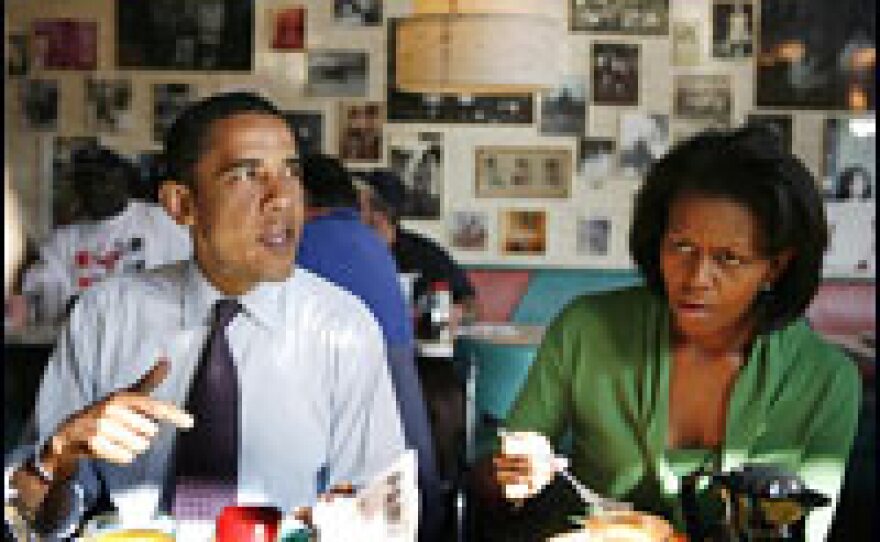



A six-week Democratic campaign sprint ends Tuesday, as Pennsylvania voters go to the polls in what pundits expect to be record numbers.
New York Sen. Hillary Clinton has spent the day so far making numerous campaign visits – even stopping for a mid-morning cheese steak — in Montgomery County, a collection of Philadelphia suburbs that only recently became overwhelmingly Democratic.
Both campaigns are trying to spin interpretations of the eventual outcome. On Tuesday, Clinton reiterated her argument that winning Pennsylvania was a victory, regardless of the margin, even if that's an "old-fashioned" way to view politics, she said.
"I think maybe the question ought to be, why can't [Illinois Sen. Barack Obama] close the deal?" Clinton told reporters. "With his extraordinary financial advantage, why can't he win a state like this one, if that's the way it turns out," she said, adding that the Obama campaign has outspent her in Pennsylvania three-to-one.
Meanwhile, Obama spokesman Bill Burton sent a statement to reporters portraying anything less than a Clinton blowout as too little, too late. "She should win big," Burton wrote. "She has family roots in the state, she has the support of the Democratic establishment—including Gov. Rendell's extensive network—and former President Clinton is fondly remembered."
Like Clinton, Obama continued to campaign Tuesday. He also squeezed in several interviews with local media. He stopped at Pamela's P&G Diner in Pittsburgh for a breakfast of pancakes and hash browns. "I always think we have a chance," he told diners about the Pennsylvania contest. "We closed a big gap. We were down 20. This is always an uphill climb, but what we feel is we've made significant progress."
"A lot of it is going to depend on turnout today," he added.
Meanwhile, the issue of race in the campaign resurfaced. Former President Bill Clinton said the Obama campaign had "played the race card" on him in South Carolina in an interview posted Monday night (MP3) on the Web site of NPR member station WHYY in Philadelphia.
"We now know, from memos from the campaign and everything, that they planned to do it all along," Bill Clinton said.
Asked about Clinton's remarks, Obama chuckled and said: "So, former President Clinton dismissed my victory in South Carolina as being similiar to Jesse Jackson, and he's suggesting that somehow I had something to do with it? Ok, well, you'd better ask him what he meant by that. I have no idea what he meant."
Last-Minute Ad Wars
Interest in this primary has been high amongst Pennsylvanians, with roughly 151,000 new Democrats registering in advance of the primary, and close to 163,000 voters changing their party affiliation to participate in the closed contest, according to the Pennsylvania Bureau of Commissions, Elections & Legislation. The state has about 4.2 million registered Democrats.
In the days leading up to the contest, the candidates stepped up their attacks on each other.
Clinton released a television ad in which a montage of devastating historical world events scrolls by as the announcer asks who would be the best candidate to lead the country.
"It's the toughest job in the world," an announcer says in the ad, as images appear of the attack on Pearl Harbor, the collapse of the Berlin Wall, Osama bin Laden, Hurricane Katrina. "You need to be ready for anything."
Obama's campaign countered with its own advertisement, "He Has What It Takes." It characterizes Obama as someone who does not use fear to "divide us." He has argued that Clinton's ads play to the "politics of fear."
Analysts Weigh In
The Pennsylvania primary owes its intensity, in part, to the six-week lag between this contest and the last one, held on March 11 in Mississippi.
Pennsylvania has 158 pledged delegates at stake — by far the largest remaining prize. Recent polls show Clinton's former double-digit lead in Pennsylvania has dwindled to the single digits — anywhere between 5 and 8 percentage points in some surveys. What is unanswered is how big a victory Clinton needs to keep the rationale for her candidacy alive.
"There'll be a big debate about the size of her victory if she wins," says Terry Madonna, a professor of political science at Franklin and Marshall College in Lancaster, Pa.
The Clinton campaign has been trying to tamp down expectations, saying that a win is a win, no matter how close. Obama, meanwhile, says he doesn't expect to win Pennsylvania, but that the results will be close.
"I feel confident that we'll do just fine tomorrow," Obama told NPR.
Randall Miller, a political analyst at Saint Joseph's University in Philadelphia, says a Clinton victory would bolster the narrative her campaign has been propagating: that she should be the nominee in November because she can win both populous swing states such as Ohio, and big "blue" states like Pennsylvania, which has voted for the Democratic candidate in the past four presidential elections.
"This narrative gained greater conviction and clarity after Ohio and Texas," Miller says. Clinton won the primary contests in both states on March 4, although Obama won the same-day Texas caucus and came out ahead in the number of pledged delegates there.
A victory Tuesday also would energize Clinton's campaign going into May's primaries — in Indiana and North Carolina on May 6, West Virginia on May 13, and Kentucky and Oregon on May 20.
But if Clinton wins Tuesday by what Madonna calls a "mushy" margin of 5 to 7 percentage points, then Obama — who has called himself the "underdog" in Pennsylvania — is likely to claim that as a moral victory of sorts. And that, Madonna says, could leave the Democratic race as muddled as ever.
Delegate Math
Nationwide, Obama maintains a lead of more than 160 pledged delegates over Clinton. She can claim around two dozen more superdelegates than Obama, but he's the one with the momentum among this group — the unaffiliated party leaders and elected officials who are free to support either candidate.
Last week alone, Obama picked up the endorsement of five additional superdelegates, including members of Congress from the upcoming primary states of North Carolina and Indiana. As of Sunday morning, Obama enters the Pennsylvania primary with a lead in the overall delegate count of 1,645 to Clinton's 1,507.
Pennsylvania's 158 delegates will be awarded proportionally, based on the popular vote in congressional districts and statewide.
Obama is expected to do well in the largely African-American and affluent southeastern quarter of the state, including Philadelphia and its surrounding suburbs, where roughly 40 percent of Pennsylvanians live, says Michael Hagen, a political scientist and Temple University professor. He says Clinton should do better in the blue-collar portions, including Pittsburgh, Scranton and Lancaster County.
Even if Clinton wins by large margins in Pennsylvania, she will be awarded, at best, 12 to 15 more pledged delegates than Obama, says Madonna of Franklin and Marshall College. That wouldn't make much of a dent in Obama's lead in the nationwide pledged delegate count. But a victory would help Clinton make the case to the superdelegates — who may end up as the ultimate arbiters of the Democratic race — that the momentum has turned in her favor.
And if Obama wins in Pennsylvania?
Madonna says that's unlikely to happen, but if it does, "I think the nomination contest is over."
From NPR staff reports and The Associated Press
Copyright 2022 NPR. To see more, visit https://www.npr.org. 9(MDAzMjM2NDYzMDEyMzc1Njk5NjAxNzY3OQ001))





